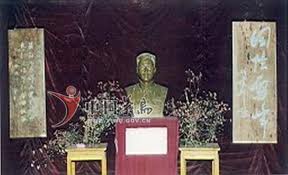Feng Xuefeng (poet): Difference between revisions
m (1 revision) |
No edit summary |
||
| (3 intermediate revisions by one other user not shown) | |||
| Line 1: | Line 1: | ||
====Date: [[:Category: | ====Date: [[:Category:1950s|1950s]]==== | ||
====Region: [[:Category:Asia|Asia]]==== | |||
====Subject: [[:Category:Political/Economic/Social Opinion|Political/Economic/Social Opinion]]==== | |||
====Medium: [[:Category:Literature|Literature]]==== | |||
====Medium: [[:Category:Literature|Literature | |||
---- | ---- | ||
[[File:Feng1.jpg|left]] | |||
'''Artist:''' Feng Xuefeng | '''Artist:''' Feng Xuefeng | ||
'''Confronting Bodies:''' Chinese Communist Party | '''Confronting Bodies:''' Chinese Communist Party | ||
'''Dates of Action:''' 1950s | '''Dates of Action:''' 1950s | ||
'''Location:''' China | '''Location:''' China | ||
'''Description of Artwork:''' Feng was a chinese poet who advocated the importance of human emotion in literary works. <P> | '''Description of Artwork:''' Feng was a chinese poet who advocated the importance of human emotion in literary works. <P> | ||
'''The Incident:''' Feng was a celebrated Chinese poet until he ran awry of the Communist Party during the 1950s. He was a spokesman for the party, upholding the view that literature and human emotion should remain separate. In 1952 he became the chief editor of "Wenyibao" (Literary and Art Gazette). With his new position he believed he could advocate his true views. He criticized the party for the "lowering of literary and professional standards" by strict political control. He was charged with revolting against Marxism, disobeying the party's orders, treating "Wenyibao" as his own property and surrendering to bourgeois ideas. <P> | '''The Incident:''' Feng was a celebrated Chinese poet until he ran awry of the Communist Party during the 1950s. He was a spokesman for the party, upholding the view that literature and human emotion should remain separate. In 1952 he became the chief editor of "Wenyibao" (Literary and Art Gazette). With his new position he believed he could advocate his true views. He criticized the party for the "lowering of literary and professional standards" by strict political control. He was charged with revolting against Marxism, disobeying the party's orders, treating "Wenyibao" as his own property and surrendering to bourgeois ideas. <P> | ||
[[File:Feng2.jpg|right]] | |||
'''Results of Incident:''' Feng pleaded guilty to all of the charges and promised to reform, however, he was demoted. During Mao Zedong's "Hundred Flowers" policy in 1956, literary control mitigated slightly and Feng began to speak out again. During the Anti-Rightist Campaign in 1957 he was accused of opposing the party and sent for reform through labor. He spent the last years of his life performing manual labor during the Cultural Revolution. However, he is now highly regarded in the People's Republic of China. <P> | |||
'''Results of Incident:''' Feng pleaded guilty to all of the charges and promised to reform, however, he was demoted. During Mao Zedong's "Hundred Flowers" policy in 1956, literary control mitigated slightly and Feng began to speak out again. During the Anti-Rightist Campaign in 1957 he was accused of opposing the party and sent for reform through labor. He spent the last years of his life performing manual labor during the Cultural Revolution. <P> | |||
'''Source:''' Censorship, A World Encyclopedia, ed. D. Jones | '''Source:''' Censorship, A World Encyclopedia, ed. D. Jones | ||
[[Category:1950s]] | |||
[[Category:20th century]] | |||
[[Category:]] | |||
[[Category:Asia]] | [[Category:Asia]] | ||
[[Category:Political/Economic/Social Opinion]] | [[Category:Political/Economic/Social Opinion]] | ||
[[Category:Literature]] | [[Category:Literature]] | ||
[[Category:Feng Xuefeng]] | [[Category:Feng Xuefeng]] | ||
__NOTOC__ | __NOTOC__ | ||
Latest revision as of 19:28, 9 November 2016
Date: 1950s
Region: Asia
Subject: Political/Economic/Social Opinion
Medium: Literature
Artist: Feng Xuefeng
Confronting Bodies: Chinese Communist Party
Dates of Action: 1950s
Location: China
Description of Artwork: Feng was a chinese poet who advocated the importance of human emotion in literary works.
The Incident: Feng was a celebrated Chinese poet until he ran awry of the Communist Party during the 1950s. He was a spokesman for the party, upholding the view that literature and human emotion should remain separate. In 1952 he became the chief editor of "Wenyibao" (Literary and Art Gazette). With his new position he believed he could advocate his true views. He criticized the party for the "lowering of literary and professional standards" by strict political control. He was charged with revolting against Marxism, disobeying the party's orders, treating "Wenyibao" as his own property and surrendering to bourgeois ideas.
Results of Incident: Feng pleaded guilty to all of the charges and promised to reform, however, he was demoted. During Mao Zedong's "Hundred Flowers" policy in 1956, literary control mitigated slightly and Feng began to speak out again. During the Anti-Rightist Campaign in 1957 he was accused of opposing the party and sent for reform through labor. He spent the last years of his life performing manual labor during the Cultural Revolution. However, he is now highly regarded in the People's Republic of China.
Source: Censorship, A World Encyclopedia, ed. D. Jones

